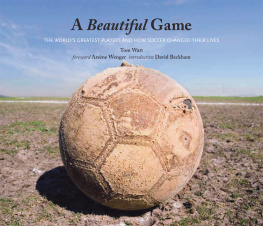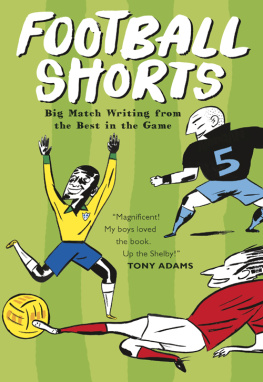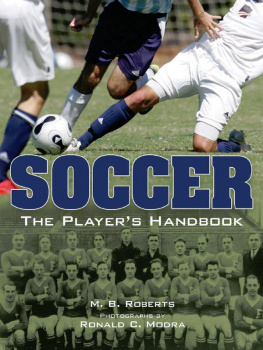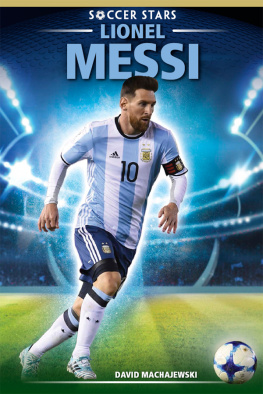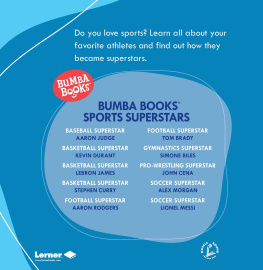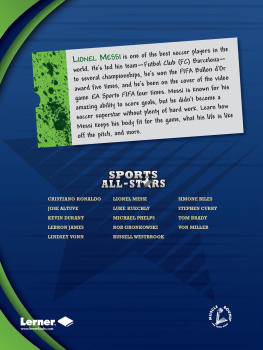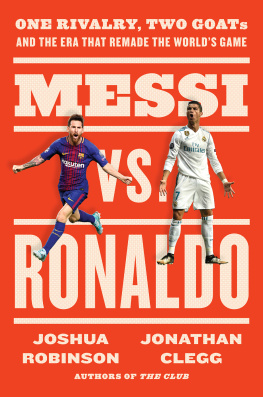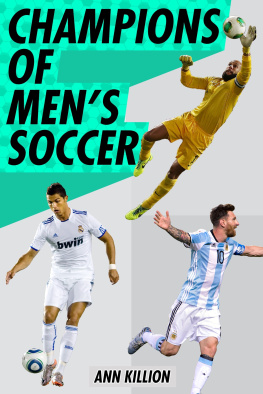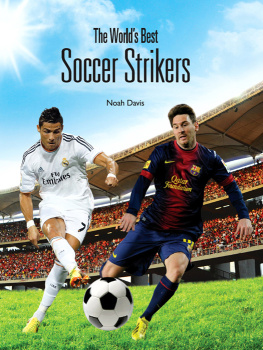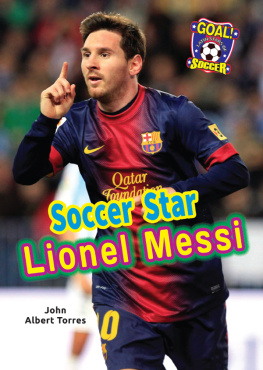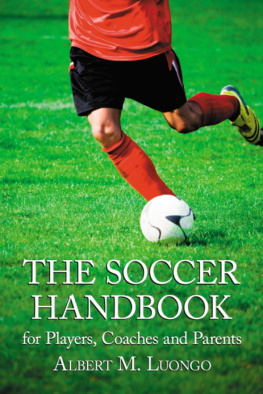Football is a beautiful game because it belongs to us all.
~ ARSNE WENGER ~
Football is a beautiful game because it belongs to us all. The whole world plays. Some of us play better than others, of course, but we all know how it feels to run and kick a ball. Wherever you are, from morning until night, you will see children playing football. Whatever sets those childrenor their parentsapart, the game can bring them together. Across every continent, now more than ever, football is a common language and a culture shared: joy, passion, knowing what it is to be in a team; an escape, an inspiration, an affirmation of identity.
A ball, a tin can, a stone or a bundle of plastic bags held together with a rubber band; anything as long as it rolls. A crowded backstreet, a dusty yard, a windswept hillside or a few square metres of beach: where you first kick a ball is part of the landscape of childhood, as much as the schoolroom or the family home. The game is at the heart of growing up, at the heart of life itself, for millions of children all over the world.
What makes a player? Skill, of course. And athleticism. Intelligence, commitment, humility, courage and desire as well. What makes a top player? All those things and one thing more: the greatest playerswhatever their backgrounds, whatever the journey they have madeall love football with the same intensity as they did when they were little boys. They love the game and maybe that, more than anything, is what makes us happy when we watch them play.
The best football players are recognized, respected and admired without regard to national borders. Their words and deeds can inspire boys and girls in their own countries and in countries on the other side of the world. Those players lives have been transformed by football and, of course, the game can transform the lives of children everywhere who look up to them as well.
A great player can say he belongs to the country of his birth; or to the country where he has reached the top of his profession. He can say he belongs to both. The truth is: the great player belongs to football. And his spiritmaybe his story toobelongs to every child who plays.
I hope you enjoy A Beautiful Game.
Arsne Wenger

LIVERPOOL, UK
I cant know what was happening in the rest of their lives. I dont even know if they were all friends: they might have been fighting each other an hour later! But, while we were playing, they were all together, sorting themselves out as teams; and all of them up for a game. Wherever you are in the world, it seems to me, thats what football can do.
~ DAVID BECKHAM ~

FREETOWN, SIERRA LEONE
Id never been anywhere like Sierra Leone. While I was at Manchester United, we went to Thailand on a tour and, while we were there, we visited a facility called the Kredtrakarn Centre in Bangkok which was supported by UNICEF. All of the girls there had been involved in sex work or child labour at some point in their lives and exploited by adults. Some of them were still very young. The centre was a refuge for all of them. That must have been at least ten years ago now but the memory has stayed with me ever since: that visit opened my eyes to things Id never thought about, things I couldnt even imagine.
That visit with United was my first introduction to UNICEF and I was honoured, afterwards, to be asked to get involved personally. I had an obvious connection with the Sport for Development programme and wanted to do something to help. Ever since agreeing to become a UNICEF Goodwill Ambassador, Id always had this idea to do a trip to Africa as part of what I was doing with the charity. I wanted to go somewhere I felt I could actually do some good by visiting; I wanted to see what help people were getting from the fundraising I was involved in back at home. If I was going to properly understand what UNICEF was trying to do, I needed to see it in action for myself. When the opportunity to do a visit like that was first mentioned, I talked to the people from UNICEF and we agreed that I should do the thing properly. I didnt want to go somewhere that had been tidied up for my visit so that we could take some nice photos. I wanted to go somewhere UNICEFs work was most needed, somewhere in real trouble. Thats when the possibility of going to Sierra Leone came up. UNICEFs focus there is on child survival: 27 per cent of children in the country die before reaching their fifth birthday, the highest percentage anywhere in the world. Once I found out about the situation and the fact that so many of those children die from preventable causes, despite some people telling me how dangerous it was and telling me I didnt need to go somewhere like that to make an impression, I was determined that Sierra Leone it would be.
It was all organized and I know a lot of work went into making that trip happen, early in 2008. It felt to me it was worth it. Dont get me wrong: I wasnt worried about my safety or anything like that before I went. To be honest, what I was worried about was what effect the things I was going to see might have on me. I suppose I didnt really have any idea how I was going to come away feeling. Ive got to say that going to Sierra Leone turned out to be one of the most rewarding, most satisfying experiences of my life. It was a trip I wont ever forget.
It may seem hard to believe but, in the end, I left Sierra Leone feeling so positive. Of course I saw hunger, illness, devastation, and it was terrible; but, at the same time, the work I saw going on genuinely inspired me. What UNICEF is trying to do in Sierra Leone really is changing kids lives there and the lives of their families too. Id never have imagined that: that I would come away from a country thats suffered so much but still feel positive about Sierra Leones future. UNICEFs work was going on and that meant there was hope. And, you know, football can be a little part of that.


Look at that picture. That was taken in a town called Mangorea, where we went to visit a newborn little girl named Mariatsu, just a day or two old. I went to Mariatsus house with the community health nurse, Angele. Thats her in the background. Mariatsus mum, Alice, was 16 and was hoping to be able to go back to school soon. Angele was there to give Mariatsu her polio vaccination and I actually got to give her the drops that morning. I cant describe the feeling to you. I just kept thinking: Am I doing this right? It was pretty incredible.
We stopped off at Mariatsus house on our way to a community health outreach post near the town of Makeni in the Northern Province. Children from all the villages nearby can go there to see the nurses who check their growth, weigh them, give them vaccinations and talk to their parents about hygiene and nutrition. After wed met the staff there and seen what was going on, we came outside and there were all these children waiting around.
I looked at the crowd of kids and thought: We should give them a football. I grabbed one and hid it behind my back. I think the kids had already seen it, though, and you can tell from the picture how excited they were.


